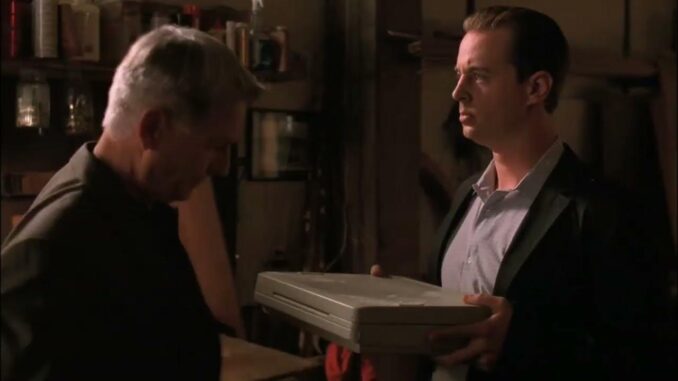
The fluorescent hum of the NCIS bullpen was a lonely lament, a stark counterpoint to the quiet intensity that had settled over the usually bustling space. Desks lay empty, keyboards silent, save for the solitary glow emanating from Timothy McGee’s monitor. He was hunched over, lost in a late-night debugging session, when a shadow fell across his screen.
He didn't need to look up. The scent of coffee and sawdust, the almost imperceptible shift in the air pressure, announced the arrival of Leroy Jethro Gibbs.
"Boss?" McGee asked, his voice betraying a hint of weariness. He straightened, rubbing the bridge of his nose. "Everything alright?"
Gibbs didn't answer immediately. He simply placed a battered, matte-black laptop onto the corner of McGee’s desk. It wasn’t a sleek government issue; this was Gibbs’s personal machine, the one McGee had seen him use for late-night schematics in his basement, for grainy surveillance footage, for anything that needed to stay resolutely off the official grid. It was an extension of Gibbs himself – private, sturdy, and hinting at secrets.
McGee looked at the laptop, then up at Gibbs, whose face was a grim tableau in the dim light. His eyes, chips of flint, bore into McGee’s, holding a depth of urgency that sent a shiver down McGee’s spine.
"I need you to hack the FBI, McGee."
The words hung in the air, a profanity uttered in a church. A jolt of pure, unadulterated shock coursed through McGee. Every fiber of his law-abiding soul, every rule and regulation he had ever committed to memory, screamed in protest. Hack the FBI? The very institution sworn to uphold the law, an ally, a partner in justice? The concept was not just illegal; it was unfathomable. It was a career-ending, life-altering transgression.
"Boss," McGee stammered, his voice barely a whisper, "you… you can't be serious. That’s… that’s federal prison, Boss. That's treason!"
Gibbs didn't flinch. His gaze remained unwavering, a silent, implicit command. "Someone's burying a truth, McGee. A truth that innocent people are gonna pay for. And no one else is gonna get to it." He paused, his voice dropping to a near growl. "You're the only one I trust to do it right. To do it clean."
The weight of Gibbs’s trust was a physical thing, settling heavily on McGee’s shoulders. It wasn't a request; it was an anointing. Gibbs was not asking him to break the law, not merely. He was asking him to cross a line into an ethical no-man's-land, to choose a deeper, more primal form of justice over the letter of the law. And he was trusting McGee, the most by-the-book member of his team, with this unholy alliance.
McGee swallowed hard. He looked at the laptop again, then back at Gibbs. In that moment, he didn't see just his boss; he saw a man pushed to the brink, a man who believed so fiercely in a larger good that he was willing to shatter protocol, jeopardize careers, and risk everything. And Gibbs, in turn, saw McGee not as a junior agent, but as the one person with the unique blend of skill, integrity, and – crucial, now – loyalty, to navigate this treacherous digital landscape.
With a deep, shaky breath, McGee reached out. His fingers, usually hesitant with such a monumental transgression, found a rhythm as he opened the laptop. The familiar Windows login screen appeared, almost mundane in the face of the extraordinary task. He took another breath, exhaling the last vestiges of doubt.
His fingers hovered over the keyboard. The blue glow of the screen bathed his face, turning his usually mild features into something stark and determined. He knew the risks. He knew the fallout. But he also knew Gibbs. And in this moment, Gibbs’s word, Gibbs’s conviction, outweighed every written law.
He began to type. The quiet tap-tap-tap of the keys filled the bullpen, a steady, rhythmic cadence against the oppressive silence. Lines of code began to flow across the screen, a digital river carving a path through secure networks. It wasn't malicious, not in the traditional sense. It was a surgical, precise infiltration, designed to extract, not destroy.
Gibbs remained, a silent sentinel, watching McGee work. He didn't offer advice, didn't check progress. His presence alone was enough. It was a shared, unspoken understanding: a silent, almost sacred pact forged in the lonely hours of the night. Legality blurred, and justice, a more primal, necessary force, took precedence. For in that moment, Timothy McGee wasn't just a federal agent; he was Gibbs's instrument, breaking the rules to uncover a truth, armed with a laptop and an unshakeable trust.